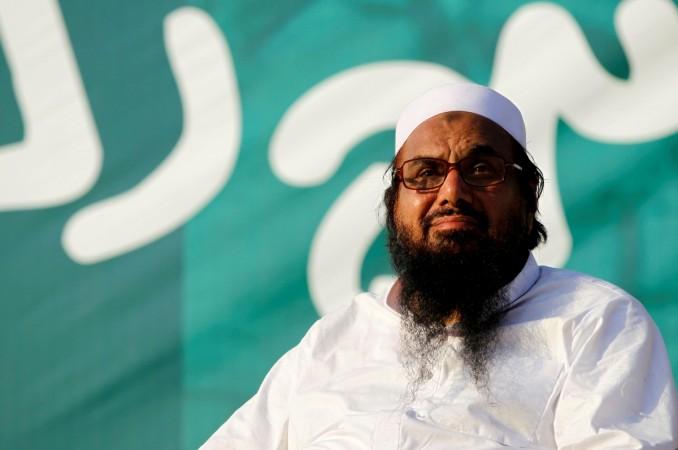
The Pakistan Army on Tuesday said the detention of Hafiz Saeed (26/11 Mumbai terror attacks mastermind, Lashkar-e-Taiba (LeT) founder and Jamaat-ud-Dawah (JuD) chief ) by the government was a "policy decision taken in the national interest." The Pakistan government placed Saeed under "house arrest" a couple of days ago.
"Jahan tak Hafiz Saeed ke pabandi ka taluk hai, yeh ek policy decision hai jo state ne national interest mein liya (The detention is a policy decision taken in the national interest by the state). The relevant department may give more information in a day or two and the situation will become clearer," Pakistan Army spokesperson Major General Asif Ghafoor said at a press conference in Rawalpindi, Pakistan, hinting at a shift in the army's stand.
India has consistently said that the Pakistan Army has kept Saeed as a "strategic asset." The reason behind the Pakistan government placing Saeed under house arrest remains unclear. However, Pakistani media claim that the decision was taken under the influence of the US administration.
"My detention order has come from Washington and not Islamabad. If someone thinks that placing me under house arrest will help check the freedom movement in Kashmir, he is living in a fool's paradise. My arrest will give a fresh impetus to the Kashmiris' struggle against India," Saeed said while addressing a press conference at his residence in Lahore's Jauhar Town. The Pakistan government allowed him to hold a press meet before being placed under house arrest, the Press Trust of India reported.
The Interior Ministry in the Punjab Province of Pakistan issued Saeed's detention order on Monday after having been directed to do so by the Federal Interior Ministry on January 27. His associates — Abdullah Ubaid, Zafar Iqbal, Abdur Rehman Abid and Qazi Kashif Niaz — were also placed under house arrest in Chauburji, situated near the JuD's Lahore headquarters.
An official from the Pakistani Interior Ministry told PTI that "the government has detained Saeed and four other JuD and Falah-e-Insaniat leaders for 90 days with effect from January 30, but this detention may further be extended if required. The government may take some further steps against the JuD and its sister organisations in the coming days." He added that names of several JuD and Falah-e-Insaniat activists were mentioned in the "exit control list" to stop them from leaving the country.
India's Ministry of External Affairs Spokesperson Vikas Swarup, hours before the Pakistan Army commented on Saeed's detention, sought a "credible crackdown" on the 26/11 mastermind while acknowledging that such measures have been taken by Pakistan in the past as well.
"Only a credible crackdown on the mastermind of the Mumbai terrorist attack and terrorist organisations involved in cross-border terrorism would be proof of Pakistan's sincerity," Swarup said.
"We have seen reports on the Pakistan Interior Ministry's order placing the Jamaat-ud-Dawah and the Falah-e-Insaniat Foundation under the watch list and also the notification under which the Falah-e-Insaniat Foundation has been included in the second schedule of their anti-terror legislation under United Nations Security Council Resolution No. 1267. We have also noted that Hafiz Saeed and four others have been placed under preventive detention," he added.
Indian officials were quoted by the Indian Express as saying that "Pakistan has played the game of putting him under arrest whenever there has been international pressure, and then releasing him after the pressure eases off, mostly after court's orders."
Saeed was put under house arrest twice following the Mumbai train blasts in 2006 but was released at the orders of the Lahore High Court. He was placed under house arrest after the 26/11 attack as well but only for short periods of time before the Lahore HC dismissed all cases against because his organisation was not banned according to anti-terror law. His arrest was declared invalid on technical grounds.
India has consistently demanded that Pakistan take action against Saeed and those responsible for the 26/11 attacks in Mumbai. However, the neighbouring country has always pleaded helplessness citing its judicial process.
Maj Gen Ghafoor, at the press meet, also said: "We want the Kashmir issue to be resolved via United Nations resolutions and dialogue, but this desire for peace should not be misconstrued as a weakness."














